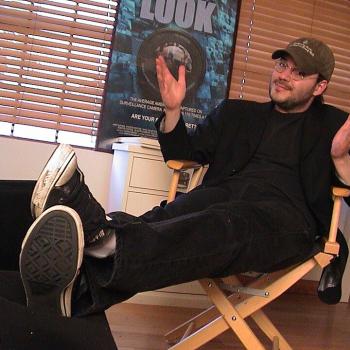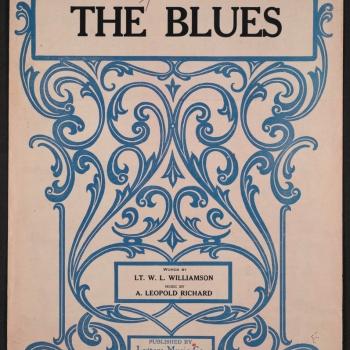
Source: Wexner Center
License
Or maybe you should? It’s hard to say. At only 1.5k logs on Letterboxd, Tamra Davis’ Skipped Parts (2000) languishes in the great DVD Library of Alexandria, preserved but seldom and ill seen. Few movies have ever had the same effect on me. It’s a mummy, a statue of the Buddha from Edo Period Japan, an invitation to CBGBs printed on crumbled, thin paper. Skipped Parts is a relic of a society bygone. That’s why I must recommend it—for professional study—even as I cringe at the thought of watching it again.
We open with a cliché. In the early 1960s, Sam Callahan (Bug Hall) clinks away at his typewriter as he, in voiceover, informs us he wants to be a novelist. At just that moment, his profligate mother (Jennier Jason Leigh) and he prepare to get kicked out by his grandfather (R. Lee Ermey), a not-so-genteel North Carolina aristocrat running for the governorship. Sam has no father, suspects only that his father is one of several men of whom his mother keeps photographs. They disgrace the family and must away to Wyoming, where Lydia, his mother, drinks, smokes, and cavorts her way from the couch, to a local Native American’s trailer, and back again. Meanwhile, Sam falls in love with Maurey (Mischa Barton) a local girl whose father spends long stretches away, caring for the animals at his ranch in the mountains.
Here, Skipped Parts veers sharply into weird territory. Maurey and Sam are 14. Yet, often left alone, they decide in a purely practical, almost clinical manner that they’d like to experience sex. As friends. Several very awkward scenes ensue that—I think—Davis means to be tender and a little funny. Lots of shots of ankles and underwear falling down, discussions of “things” and “goo.” Sam dreams often of Drew Barrymore, who kisses him, at one point, on the mouth. As a viewer, “awkward” barely begins to describe it.
At this point, I wanted to lend the movie the benefit of the doubt. Okay—things have changed, sure. Both our expectations about what’s acceptable and the general demeanor of young people toward sex. They’re having less of it and want less of it in their TV shows and movies. Certainly, porn is everywhere. In both the 2000s and 1960s, parents failed to “properly educate” their kids. So, you got teen pregnancy and the whole rigamarole. I convinced myself Skipped Parts stood on morals.
Not so fast. Sam’s mother begins offering them advice, jokingly, flippantly but actually. Maurey becomes pregnant and full-fledged communal breakdown ensues, that is, until the power of found family can overcome the tyranny of blood (Sam’s grandfather). Color me confused.
The performances don’t help. Bug Hall remains stilted, though fine, throughout. Given the subject matter though, I have to imagine this film played some role in his becoming a traditionalist Catholic and retreating into the deep Midwest with his barefoot wife and sullen children. Mischa Barton carries herself in the alien way she always does. In some films, I love it. Here, it’s intriguing but ultimately just adds to the oddity of it all, makes Skipped Parts feel like a joke played on exactly no one.
Is it just supposed to be funny, then? The whole thing nothing but a big joke? But then why go here in the first place? Admittedly, 2000 showed less reticence in explicitly depicting sexuality. The term “jailbait” floated around. If right wingers have something right, it’s that we spared fewer prayers for sensitives back then. Sure. But none of that even begins to explain Skipped Parts.
I still don’t have any answers, not yet anyway. Who knows if I’ll even want to think about this too much more? But it seems important as a cultural object. I can’t help but feel like it tells us something, whispers from the not-so-distant past some truth that will illuminate the present. But rewatch it? I don’t know. Watch it for the first time? Reader, that decision, rests with you.













